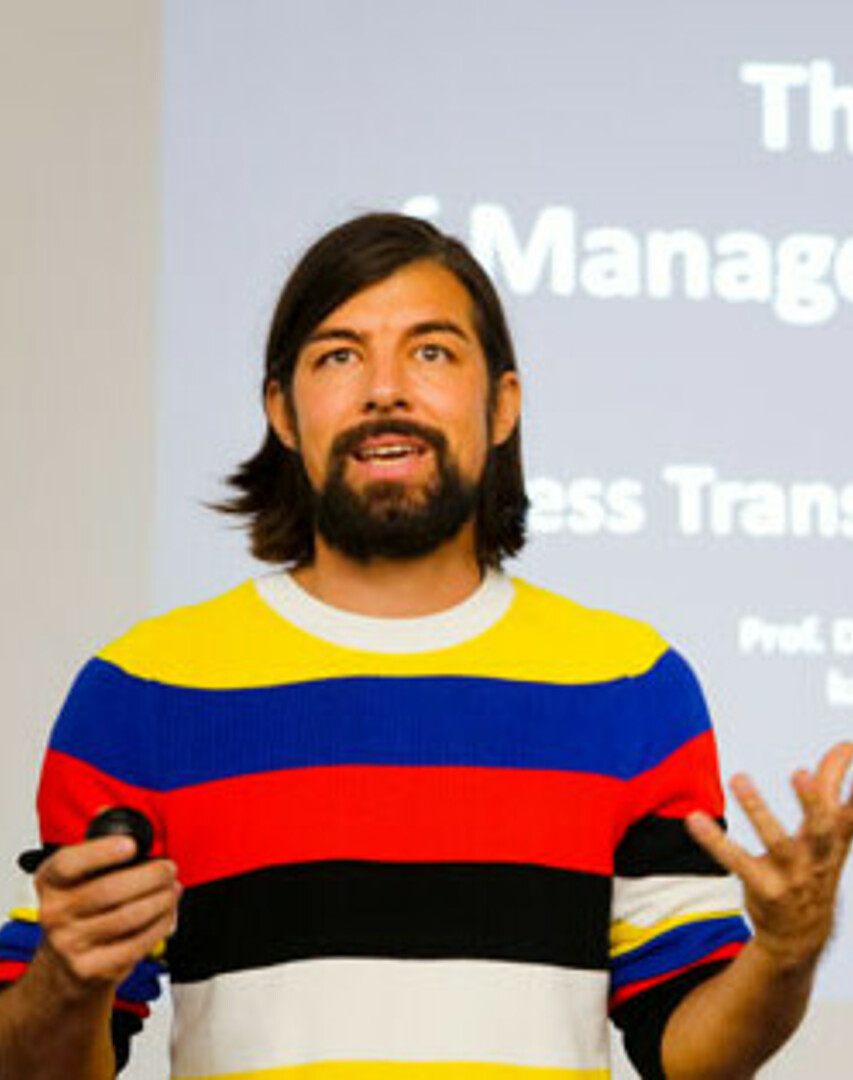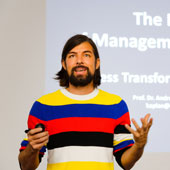-

©ESCP EUROPE
29.10.2019"We have to be able to take everyone on the journey."
Professor Andreas Kaplan is a Brain City Berlin ambassador and Rector of ESCP Europe Business School Berlin. The economist's research is into the impact of artificial intelligence. Currently, he is working asking how our society will change thanks to artificial intelligence. We spoke with him about the opportunities and risks of AI, humane digitalisation, and what higher education institutions can do in this context.

Prof. Dr. Andreas Kaplan
ESCP Europe Berlin
We need clever minds. And the more international and open the city is, the more bright minds come to work here. Berlin's made it happen.
Professor Kaplan, the development of the AI is progressing rapidly worldwide. What does this mean for our society?
The dangers are obvious: From unemployment in certain areas to the manipulation of elections and destabilisation of democracies. Such negative phenomena will certainly become even more pronounced with the increasing development of artificial intelligence. On the positive side, AI is already making life easier for us. It can also create jobs and do work for which increasingly fewer human resources are available. Take the care system, for example: in nursing homes and for at-home care, more and more robots are likely to be used in the future. One can, of course, claim that this will lead to even more isolation in old age. On the other hand, there is already age-related loneliness. To sum it up: it is basically about an ethical and responsible use of the technology.
Europe, including Germany, is lagging behind China and the USA in the development of AI. You even speak of a "Cold Tech War." What do you think needs to change?
Artificial intelligence needs data. In other words, states and regions that don't place as much value on privacy as we do here in Europe will have a competitive advantage. It is not without reason that China and the US are ahead of us in terms of AI. Don’t get me wrong. data protection is crucial. But in order to keep pace with development, it will be important to raise public awareness that data protection can limit innovation. If people become aware of this, it might be possible to address the issue of privacy differently than is currently the case. I also think that not every bike rental company needs to know where their customers are going. However, such anonymised data could be very helpful for the development of a city, i.e. the public sector.
"Human digitalisation:" does the world need to adapt to AI or does AI need to adapt to the world?
Artificial intelligence always adapts to the world. Because it, at least for the moment, is created by humans. It is about the requirements of the economy and society. We're currently trying to fill in gaps. However, innovation and progress are also bringing about change. Human digitalisation means that the state and some self-governing companies will deliberately regulate development during transitional phases. This will give population groups that are initially in a worse position due to digitalisation and the associated change the opportunity to adapt.
Can you give an example?
Take Uber. In Germany, Uber can't operate like it can in other countries, because the local taxi drivers have been protected by law. And that's a good thing. This gives the market the opportunity to adapt to progress during a transitional period. But it also has to be understood as a transitional period and not as a permanent blockade. In the near future, however, there will be neither Uber nor taxi drivers, but instead self-driving cars. Legislators should already think about what will happen then. However, such a perspective is often still lacking in politics. The question is: how do we as a society manage to accommodate or motivate those who will lose their jobs as a result of digitalisation? Whether an Uber or a taxi driver, we must bring them on this journey. In other words, ways need to be found where less qualified people will not be left out in the future.
What should students have in order to prepare for the digital future?
Interdisciplinary education is very important today. Our students will have to adapt and rethink their career several times. They will have to be extremely adaptable and flexible. The more basic vocabulary from different areas that our graduates master, the easier it will be for them to take control of their professional lives in the future. Lifelong learning is the keyword here. In addition, every student, no matter what subject they're in, should have taken at least one course in coding. They don't necessarily need to be able to program afterwards. But when they're working with a machine later, it will be good for them to understand in principle how it works. In addition, an entrepreneurial readiness to take risks will be an advantage. Such thinking can be promoted at the universities. For example, by conveying that failures can also be helpful for long-term entrepreneurial success.
What else can universities do in this context?
They can integrate appropriate courses into the curriculum. This includes courses on the ethical implementation of artificial intelligence. I also think it will be important to motivate and encourage more women to go into this field. So far, women have not become very involved in AI-related occupations, although a qualified workforce is urgently needed. There is still a lot of potential here. Another important point: universities not only educate Europeans, but also students from other regions of the world where issues such as privacy and human rights are not as highly valued and supported as they are here. An appropriately designed curriculum could advance humane digitalisation.
Are there concrete examples of such courses at ESCP Europe in Berlin?
We are on the right track. We already have courses on AI and ethics in some of our programmes. Even programming courses already exist in several of our degree programmes. We specifically promote women in our female leadership courses as well as in our community events. All in all, ESCP Europe in Berlin specialises in digitalisation, entrepreneurship, and sustainability. So much is going on here. But, of course, one can always do more.
To what extent are you working with business to address digitalisation?
For us as an international business school, the exchange between theory and practice is very important. For example, for our master's programme in strategy and digital business, we have been able to bring international management consultancy Bain & Company on board as a strategic partner. Last year, Bain opened one of the world's two digital discovery hubs at Potsdamer Platz. The company collaborates with us on content, providing lecturers on artificial intelligence, and our students gain direct insight into the kinds of projects being worked on at the digital discovery hub. To name yet another current research example: we recently founded our European Center for Digital Competitiveness at ESCP Europe Berlin under the direction of Professor Meissner. We are supported by co-initiator and tech investor Klaus Hommels, who is no stranger to the start-up scene. The centre's goal is to move Europe forward in digitalisation. In addition, we want to use the centre to promote responsible use of technology.
Why is Berlin a good location for you?
Berlin is a fantastic location! First of all, the very close connection between business and science makes the city special. There are great academic institutions in Berlin. That business and science work hand in hand here is a very good basis. Berlin also attracts many creative minds and is therefore far above the international average. This is a great advantage of Berlin: we need clever minds. And the more international and open the city is, the more bright minds come to work here. Berlin's made it happen. In addition, living here is still more affordable than competing cities in Europe like London and Paris.
If you could make a wish for anything related to the development of AI, what would it be?
I would like to see all the groups and sections of society in society take part in its development. I would like to see human beings always be at the centre of the digital transformation. And also that we approach the topic with a positive attitude. Entrepreneurship means: one should take chances and get out there and try something. You just have to take a positive attitude and say: we're going to create something great! (vdo)
Ambassador-Portrait of Prof. Dr. Andreas M. Kaplan





































































































![[Translate to English:] [Translate to English:]](/fileadmin/_processed_/9/d/csm_bwasihun-vdo_558x314_c0d384ce60.jpg)
![[Translate to English:] Berlin University Alliance/Matthias Heyde [Translate to English:]](/fileadmin/_processed_/5/a/csm_Berlin_University_Alliance_Matthias_Heyde-558x314_4bc591ca3c.jpg)
![[Translate to English:] David Ausserhofer/IGB [Translate to English:]](/fileadmin/_processed_/6/f/csm_Hupfer__Michael_____R__David_Ausserhofer_588x314_6fef164e57.jpg)
![[Translate to English:] Helena Lopes / Unsplash [Translate to English:]](/fileadmin/_processed_/b/6/csm_helena-lopes-1338810-unsplash_558x314_857802ad2f.jpg)
![[Translate to English:] HZB/M. Setzpfandt [Translate to English:]](/fileadmin/_processed_/f/a/csm_LNDW_HZB_558x314_e1e3500ed5.jpg)
![[Translate to English:] Tim Landgraf [Translate to English:]](/fileadmin/_processed_/0/7/csm_Car2CarEnergySharing_Tim_Landgraf_558x314_485bf716e9.jpg)
![[Translate to English:] [Translate to English:]](/fileadmin/_processed_/b/6/csm_Open-Access_Berlin-Partner_Wu__stenhagen_558x314_dd0c6e714d.jpg)
![[Translate to English:] Thomas Rosenthal - Museum für Naturkunde Berlin [Translate to English:]](/fileadmin/_processed_/6/d/csm_Museum_fu___er_Naturkunde_Berlin_Thomas_Rosenthal_f11b8ba056.jpg)
![[Translate to English:] [Translate to English:]](/fileadmin/_processed_/f/c/csm_TU_Berlin_Cem_Avsar_558x314_4b07bcb055.jpg)